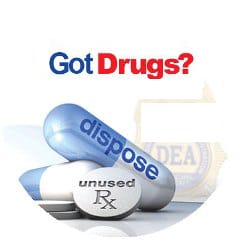
National Prescription Drug Take-Back Day is scheduled for April 24th from 10:00 a.m. to 2:00 p.m., local time. The program seeks to offer a safe, convenient, and responsible way in which to dispose of prescription medications, according to the Department of Justice The program is also meant to educate the general public about the potential […]
 National Prescription Drug Take-Back Day is scheduled for April 24th from 10:00 a.m. to 2:00 p.m., local time. The program seeks to offer a safe, convenient, and responsible way in which to dispose of prescription medications, according to the Department of Justice
National Prescription Drug Take-Back Day is scheduled for April 24th from 10:00 a.m. to 2:00 p.m., local time. The program seeks to offer a safe, convenient, and responsible way in which to dispose of prescription medications, according to the Department of Justice
The program is also meant to educate the general public about the potential likelihood of medication abuse, the Department of Justice indicates. Appropriately disposing of medications helps fight one of the key ways in which young people access drugs and develop substance abuse problems, wrote the Mercury News.
According to the Drug Enforcement Agency (DEA), which sponsors the program, more than 1,700 tons of expired, unwanted prescription medications in the past three and a-half years. Now, the DEA and more than 4,200 national, tribal, and community law enforcement partners are holding the next National Prescription Drug Take-Back Day this Saturday.
As part of the initiative, Americans are able, and urged to, take their pills to any one of over 5,600 collection locations nationwide. The program is free and anonymous, and no questions are asked. The DEA pointed out that the events are meant to remove potentially dangerous, unused, or expired prescription medications from homes.
The program has been successful. Just last October, Americans turned in 324 tons of prescription medications and, since the first DEA event in September 2010, a total of 3.4 million pounds of pills have been returned.
Unused drugs in the home are considered a public health and safety issue as the medications may be accidentally ingested, stolen, and misused or abused, according to the DEA. In fact, nearly twice as many Americans—6.8 million—abuse prescription drugs compared to the number of Americans using cocaine, hallucinogens, heroin, and inhalants combined, according to 2012’s National Survey on Drug Use and Health.
Also, more Americans succumbed to prescription medication overdoses in 2010—22,134, of which 16,651 involved narcotic pain relievers—than from motor vehicle accidents, according to the U.S. Centers for Disease Control and Prevention (CDC).
Most abused prescriptions drugs are received from family and friends according to surveys of users, the CDC indicated. This includes medication taken from home medicine cabinets.
Collection site locations may be obtained at www.DEA.gov (click on “Got Drugs?”) or call 1.800.882.9539.
According to the DEA, only pills, including pet medications in pill form and supplements, may be turned in to collection sites. Liquids; creams; patches; syringes and other sharps; and illicit drugs, such as cocaine, heroin, marijuana, and methamphetamine will not be accepted. Authorities said prescription medication does not need to be removed from original containers before drop-off.


